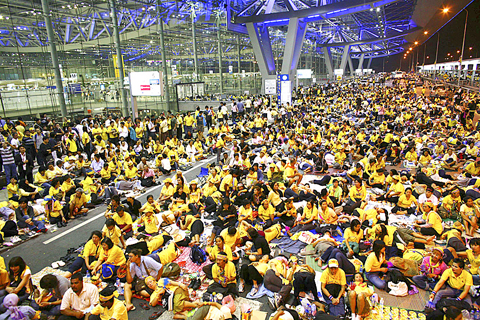Thailand’s army commander urged protesters yesterday to leave Bangkok airport and called for elections to end the country’s political crisis after a day of chaos in which thousands of travelers were stranded.
All flights were canceled and frustrated passengers bused to hotels, as protesters shut down Suvarnabhumi Airport in a major escalation of their four-month campaign to oust the prime minister.
“The government should give the public a chance to decide in a fresh election,” General Anupong Paochinda said at a news conference after meeting with high-level government officials, academics, economists and security officials.

PHOTO: AP
Suriyasai Katasila, a spokesman for the protesters, said the group would not abide by the army chief’s plea.
“Right now, our demand remains the same. If the government does not quit, we will not quit,” he said.
Thai Prime Minister Somchai Wongsawat returned from an APEC summit in Peru yesterday and said that he had not decided whether to heed the call to dissolve parliament.
The protest group, the People’s Alliance for Democracy (PAD), appears intent on forcing the military to intervene and bring down the elected regime.
There was no word on when flights might resume.
Early yesterday assailants threw four explosives at PAD demonstrators, including one targeting a group about 1km from the airport.
A second was tossed into a crowd at the domestic Don Muang airport, injuring three others, police said. The two other explosives did not injure anyone. It was unclear who staged the attacks.
Meanwhile, the Ministry of Foreign Affairs yesterday reminded Taiwanese nationals in Thailand to exercise caution.
Taiwanese citizens who need help can call the ministry’s representative office in Bangkok at 081-666-4006 around-the-clock, Department of Information and Cultural Affairs deputy director-general James Chang (章計平) said.
The Taipei Association of Travel Agents said about 1,000 Taiwanese travelers have been affected by the flight cancelations at Bangkok’s main airport, including about 500 who were scheduled to fly to Thailand yesterday and 400 who are stranded in Bangkok. Those stranded in Thailand may have to wait another day before they would be able to return, while tourists preparing to fly to Thailand may need to postpone their schedules for a few days, a spokesman for the association said.

MORE VISITORS: The Tourism Administration said that it is seeing positive prospects in its efforts to expand the tourism market in North America and Europe Taiwan has been ranked as the cheapest place in the world to travel to this year, based on a list recommended by NerdWallet. The San Francisco-based personal finance company said that Taiwan topped the list of 16 nations it chose for budget travelers because US tourists do not need visas and travelers can easily have a good meal for less than US$10. A bus ride in Taipei costs just under US$0.50, while subway rides start at US$0.60, the firm said, adding that public transportation in Taiwan is easy to navigate. The firm also called Taiwan a “food lover’s paradise,” citing inexpensive breakfast stalls

TRADE: A mandatory declaration of origin for manufactured goods bound for the US is to take effect on May 7 to block China from exploiting Taiwan’s trade channels All products manufactured in Taiwan and exported to the US must include a signed declaration of origin starting on May 7, the Bureau of Foreign Trade announced yesterday. US President Donald Trump on April 2 imposed a 32 percent tariff on imports from Taiwan, but one week later announced a 90-day pause on its implementation. However, a universal 10 percent tariff was immediately applied to most imports from around the world. On April 12, the Trump administration further exempted computers, smartphones and semiconductors from the new tariffs. In response, President William Lai’s (賴清德) administration has introduced a series of countermeasures to support affected

CROSS-STRAIT: The vast majority of Taiwanese support maintaining the ‘status quo,’ while concern is rising about Beijing’s influence operations More than eight out of 10 Taiwanese reject Beijing’s “one country, two systems” framework for cross-strait relations, according to a survey released by the Mainland Affairs Council (MAC) on Thursday. The MAC’s latest quarterly survey found that 84.4 percent of respondents opposed Beijing’s “one country, two systems” formula for handling cross-strait relations — a figure consistent with past polling. Over the past three years, opposition to the framework has remained high, ranging from a low of 83.6 percent in April 2023 to a peak of 89.6 percent in April last year. In the most recent poll, 82.5 percent also rejected China’s

PLUGGING HOLES: The amendments would bring the legislation in line with systems found in other countries such as Japan and the US, Legislator Chen Kuan-ting said Democratic Progressive Party (DPP) Legislator Chen Kuan-ting (陳冠廷) has proposed amending national security legislation amid a spate of espionage cases. Potential gaps in security vetting procedures for personnel with access to sensitive information prompted him to propose the amendments, which would introduce changes to Article 14 of the Classified National Security Information Protection Act (國家機密保護法), Chen said yesterday. The proposal, which aims to enhance interagency vetting procedures and reduce the risk of classified information leaks, would establish a comprehensive security clearance system in Taiwan, he said. The amendment would require character and loyalty checks for civil servants and intelligence personnel prior to